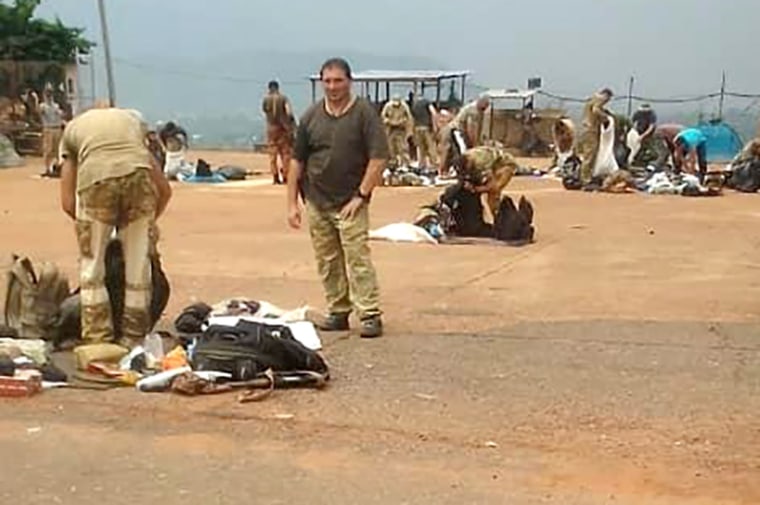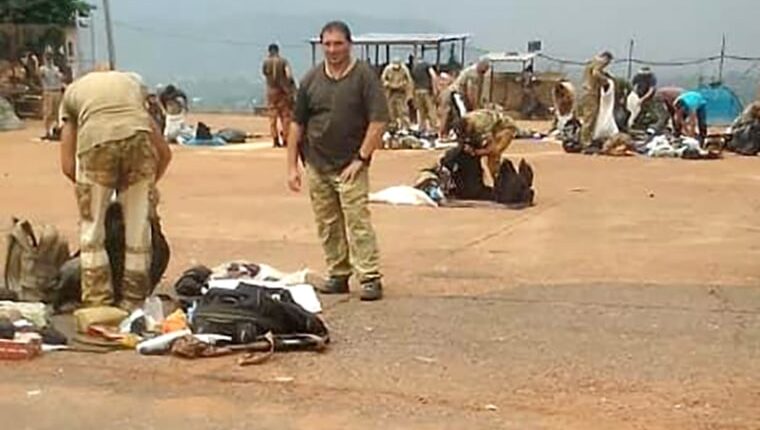Hundreds of troops in the Wagner paramilitary organization have been seen flying out of the Central African Republic in recent days, prompting questions about whether Moscow is purging the group after its mutiny in Russia last month.
More than 600 Wagner Group employees were spotted this week departing from the airport in the capital Bangui, according to members of non-governmental organizations and analysts tracking events in the Central African Republic (CAR).
NBC News obtained a video that appears to show dozens of Wagner operatives in uniform at a military base in Bangui this week. Gathered near a helipad, they sorted through bags and other belongings spread out on the ground around them.

Obtained by NBC News
The regional French-language newspaper Jeune Afrique first reported the departure of hundreds of Wagner personnel on Thursday.
The flights came as the Kremlin has sought to reassert its authority over the organization two weeks after a short-lived rebellion where Wagner chief Yevgeny Prigozhin openly defied Russian President Vladimir Putin and ordered his troops fighting in Ukraine to march on Moscow.
The June 23-24 rebellion ended after Belarus brokered a deal between Wagner and Putin’s government. But how the Russia president will manage the group’s sprawling military and business operations in the Middle East and Africa remains an open question.
It was unclear if the departure of the Wagner personnel from CAR was part of a routine rotation of troops, a large-scale sacking by Moscow designed to curtail Progozhin’s influence, or if Wagner loyalists refused to work under the Russian ministry of defense.
Moscow might be attempting to reestablish its control over Wagner’s forces, but it is still too early to draw any firm conclusions, according to Nathalia Dukhan, senior investigator at The Sentry, a nonprofit advocacy group that reports on corruption, repression and human rights abuses.
Other experts agreed. “Purges are very likely, as loyalty is the hot button issue of the moment for Putin,” said Alia Brahimi, a senior fellow with the Atlantic Council think tank.
In the days after the mutiny, Putin praised Russian military leaders for fending off Prigozhin’s mutiny and for averting a “civil war.” Russian authorities have raided Wagner’s headquarters in St. Petersburg.
Fidele Gouandjika, an adviser to CAR’s President Faustin-Archange Touadéra, said there has been “no change” in the Wagner Group’s presence in recent days. Russian “instructors” were still on the ground along with the organization’s senior leader, Vitali Perfilev, Gouandjika told NBC News.
The mutiny led by Prigozhin two weeks ago was “an internal matter for Russia,” he said, adding that the Central African Republic had an agreement with the Russian Federation, not the Wagner group.
A senior Wagner representative in the country, Dmitry Sytii, who runs the Russian cultural center, also implied that the paramilitaries had not been ordered to leave the country, telling NBC News: “I haven’t started to pack my bags yet. When is the plane?”
Lewis Mudge, Central Africa director at Human Rights Watch, said it was unclear if Wagner was facing a major shake-up in CAR.
“We are hearing rumors from multiple sources, including from some at the airport, but the movement of Wagner forces in and out of Bangui M’Poko International Airport is not in and of itself unusual,” Mudge said. “So for right now, it’s still very much a situation of wait and see.”
The White House National Security Council and the Central Intelligence Agency declined to comment. Last week, National Security Council spokesperson John Kirby said there was “no indication that Wagner is decreasing its intent to exploit African countries.”
Wagner mercenaries first arrived in CAR in 2018 as military advisers, and have worked alongside the nation’s armed forces to fight a rebellion threatening the government. The U.S. government and human rights groups have accused Wagner of committing atrocities in Africa and of exploiting countries’ gold and diamond mines. In January, the U.S. designated Wagner a transnational criminal organization.
The Kremlin likely will change Wagner’s name and oust some figures deemed too close to Prigozhin, said Colin Clarke, a senior research fellow at The Soufan Center, a nonprofit research center focusing on global security issues.
But even with a “rebranding,” Russia is unlikely to withdraw from Wagner’s security contracts, disinformation operations and mining ventures that have boosted Moscow’s reach in North Africa and Sub-Saharan Africa, Clarke and other experts said.
“The services that Wagner provides for the Russians in Africa are essential,” Clarke said. “That’s not going to go away. They need it.”
Russian Foreign Minister Sergei Lavrov said in a recent interview with Russia Today that Prigozhin’s revolt would not affect Moscow’s relations with “partners and friends” and that Wagner operatives would remain in the Central African Republic, Mali and other African countries.
“At their request, several hundred servicemen are working in the CAR as instructors — this work, of course, will continue,” Lavrov said.
In public remarks after the mutiny, Putin thanked the military and law enforcement for halting the rebellion and said for the first time public that the government had bankrolled the Wagner Group, providing 86 billion rubles or about $1 billion.
“Even though Wagner gets referred to as a private military company, it really isn’t a completely private military company. It’s really a creature of the Russian military intelligence agency,” said Kimberly Marten, a professor at Barnard College, Columbia University.
Experts said that Putin’s admission means Russia will have no way of denying responsibility for Wagner’s abuses in Africa and other parts of the world.
“The Wagner Group’s exploitative business and security model, which involves rapacious economic policies and atrocities against civilians, is now attributable to the Russian state,” said Brahimi of the Atlantic Council. “The veil has been lifted and Putin will have to personally own the predation in north and sub-Saharan Africa.”
Source: | This article originally belongs to Nbcnews.com










